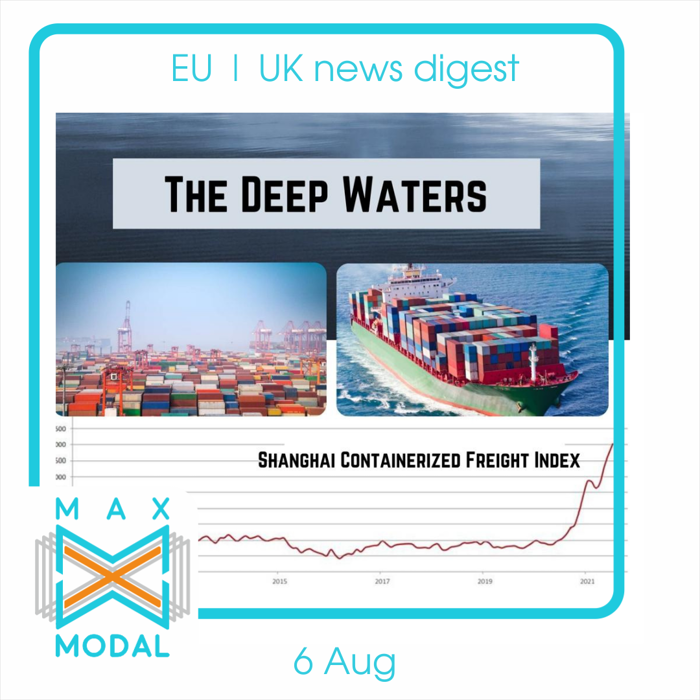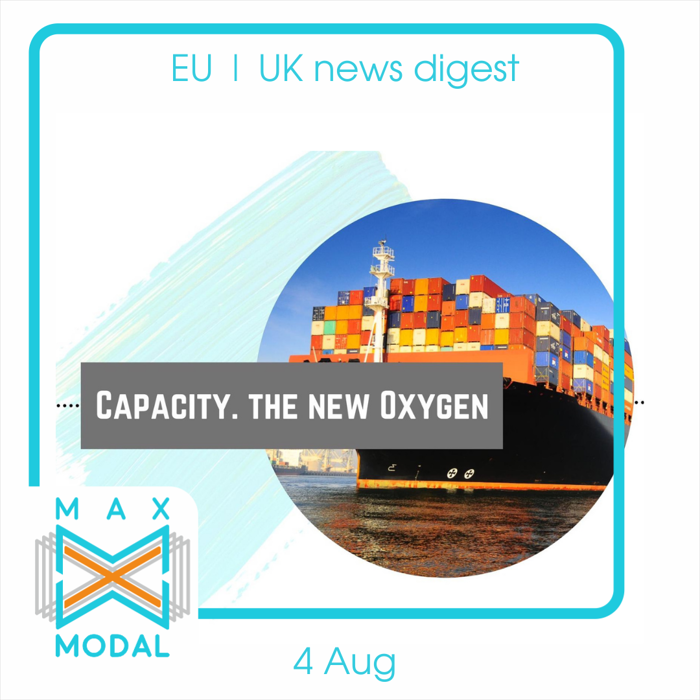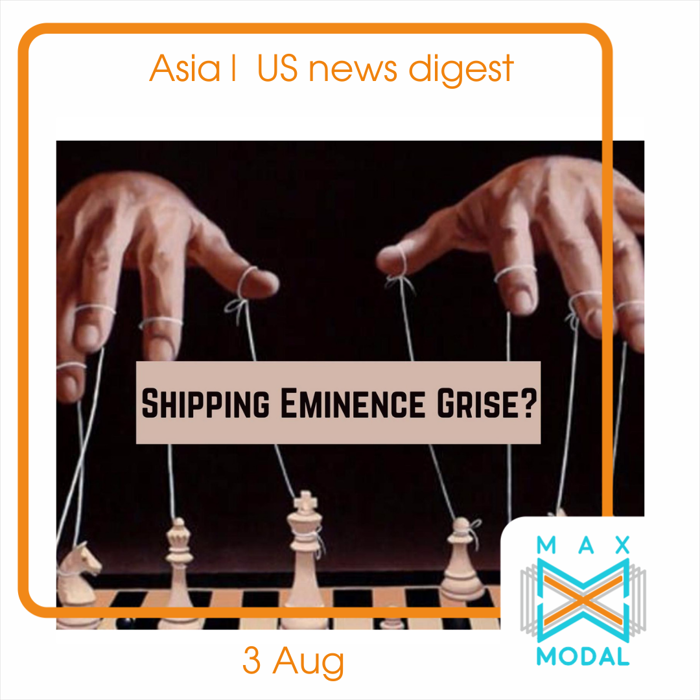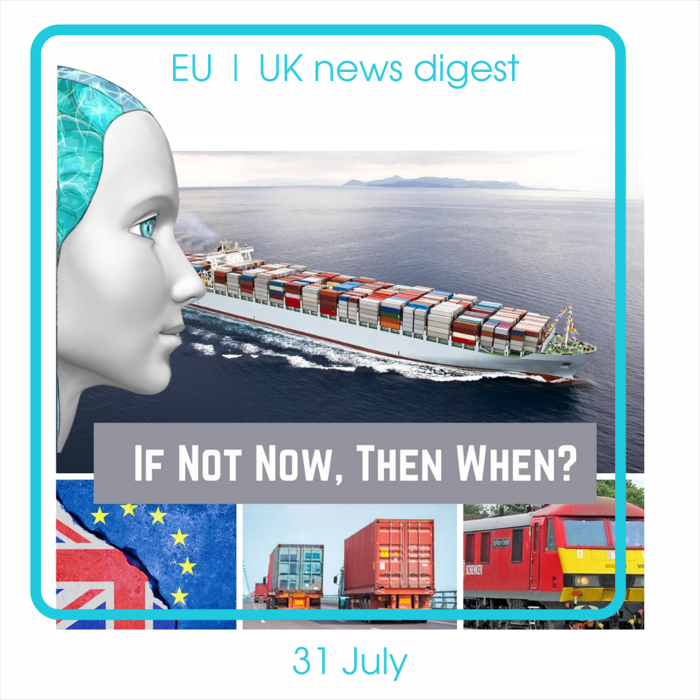Diving deeper into unknown waters – the unchartered territory.
Although everyone understood (and then witnessed) what impact the combination of high demand, under-capacity, and supply chain disruption would have on the shipping industry, nobody could have expected that long-term contracted rates would jump to 28.1%(compared with June) and blow the previous record of 11.3% in May 2019. The hike of this magnitude is a clear indicator of how constrained the industry is now. Experts are anticipating companies’ next move – big changes are looming over and it is a matter of time when we all see how significant they will be from the global perspective.
Average hire rates have jumped by almost 47% just in one month. While chartering fraternity is looking for the right words to describe the astonishing situation, it is crystal clear that the market is deep into an uncharted zone. S&P deals are now fully controlled by liner operators as they buy ships and then flip them around to a tramp owner along with their charter-back at a corresponding rate.
The capacity turmoil in terms of equipment also adds logs in the fire. Despite the developing volumes, the obstacles regarding it can hold an explanation of the current shortages. In comparison to the historical average, these days the factor indicating TEU of equipment in circulation has dropped. Companies are wishing to become asset-light but this intention is strongly affecting the delivery time, as equipment shortage is the bottleneck of the industry. Moreover, the issues will take significant time to resolve since the annual production output is capped at 4.5 mil. to 5 mil. TEU, so none of the important factors is in favor.
More factories are shutting their production down due to the new lockdowns in China and Vietnam. Among them are already Toyota, Honda, and Nike. None is left unaffected – many electronic companies are struggling with keeping up their production sights up and running because of the complicated situation. Ships continue queuing in the South China Sea.
Rail is doing moderately better, although the definition of “better” can hardly be identified in the current context. DB Cargo UK is planning to lease its Mossend EuroTerminal rail freight facility near Glasgow to Maritime Intermodal. The latter is extremely important as it allows facilities for changing between diesel and electric traction.
To provide further support for the growth from Intra-European feeder networks, Peel Ports has made an investment in two ship-to-shore cranes for the Port of Liverpool that will significantly enhance the Port’s capabilities for ACL. It also further compliments the Irish Sea hub proposition connecting the world to Liverpool and the largest consuming and exporting region of the UK. The crane development also occurs in Budapest. The repair of one of the two cranes at the BILK terminal has reached its final stage. Reconstruction work is underway.
In airfreight, the shortage of handlers has led to some companies losing about one-third of their capacity. German and Belgian airports are reported to be among the worst affected. As the flights are coming back, there is a lack of skilled workers and this technical unemployment cannot be reversed shortly. The situation is evolving very fast, so the best strategy is to be dynamic and reactive. Some companies have begun to cut or suspend short-time work for ground staff, while their handling arm is currently hiring.
A period can finally be put at the end of the Ever Given’s epos as the ship has arrived in the Port of Felixstowe, in the UK, four months after its initial schedule.

Although it is a universal truth that patience is a virtue, shipping companies would gladly disagree. The lead time is increasing and so does the pressure.
More complaints fire up against carriers as well as overall anger at the failure of shipping lines to meet their contractual obligations spikes up in the industry. Following its formal call for FMC to take matters in their hands, MCS Industries has stated that the problem is that when negotiating the prices, the company accepted that prices would be 70-80% higher than last year, but they didn’t get the containers agreed to them. As a result, the prices surged and now there’s barely any room for negotiations. This is a low blow especially since the market situation continues to remain challenging.
Due to the disruptions, the dwell times for many companies have increased and with the soaring demand they have to add more containers. Although they are being built at a relatively fast rate, it is difficult to get them delivered because of congestion and numerous blockages. This tendency is spreading from intermodal to rail resulting in volume-limiting rail allocations. Moreover, some companies are even planning for up to four weeks of additional lead time to ship their manufacturing supplies from Asia or Europe.
The obstacles are pressuring the manufacturing sector into slow supply deliveries. With high demand, factories are sucking inventory; the shortage of raw materials leads to long lead time for purchases; the lead time for raw materials themselves is also record high. However, the positive news about employment levels going up gives hope that it will also improve deliveries and inventories.
It seems like the alternative routes for shipping are not always a good idea. As more ocean carriers continue to shift tonnage from intra-Asia and north-south trades to east-west routes, it drives the freight rates up in these directions too. In addition, companies have been rigorously expanding their capacities, so now they have the opportunity to demand premium fees from shippers to guarantee equipment and shipment. However, no other routes will be able to fully substitute Asia, so as long as lockdowns remain confined in China, the impact on freight markets is likely to be muted. The recent data has shown that current queues are 76% above the five-year average.
Meanwhile, the anti-monopoly battle in South Korea takes a new span. Regarding the ongoing action to rescind the massive fines imposed by the Korea Fair Trade Commission on several major liner operators, lawmakers are now planning to amend the country’s Monopoly Regulation and Fair Trade Act to exempt the shipping industry from its jurisdiction to prevent a recurrence. They claim that the recently achieved improvements in the industry revitalisation simply cannot be destroyed with larger fines.
Meanwhile, the new surcharges from European ports to several American destinations have been announced. There will be Peak Season Surcharge of US$592 per TEU and US$1,185 per FEU for all cargo types, from Italy to West Coast South America, East Coast Central America and the Caribbean, West Coast Central America. In addition, FAK rates have also been increased from the Mediterranean direction. The forecast still predicts that the current situation will remain the same. More bottlenecks at ports and shortages of equipment in supply chains will be caused. The recent data has reported the increased Ocean volumes of 15%.
The new COVID restrictions in China have caused the rise of the airfreight rates. The latest update has shown that they reached $9.60, $11 and $12 per kg.
As a means of addressing the capacity crisis, Yang Ming has launched extra loader services on the transpacific and Asia-Europe tradelanes. The company is partly owned by the government and its new initiative is the result of cooperation of the officials with the Maritime Port Bureau.

Capacity wanted! The new scapegoat of the crisis.
For days, the boom in consumer demand has been considered the scapegoat of the industry’s misfortunes, when it turns out it is a capacity shortage. Recent data indicates, that only the US shows the unusually high demand, while in other regions it is average. However, shippers are fighting for sufficient capacity and it is a losing game mostly because of the delays caused by congestions. In February, almost 12% of global capacity was absorbed by delays. By April, this had dropped to 8.8% but has since increased to now being 9.6% in June 2021. The solution comes only from solving the blockages on the landslide. At the same time, there are still indications that customer demand is surging. From its perspective, Hapag-Lloyd has stated that it is going to make between $9.2 billion and $11.2 billion thanks to elevated demand. Maersk, in turn, predicts that the exceptional situation that everyone is witnessing now will continue until at least the end of 2021, reporting increased Ocean volumes of 15%.
The UK customs has completed a major milestone with the announcement by HMRC of the final implementation of the CDS system for processing Customs declarations. It is designed to provide a more secure and stable platform that has the capacity and capability to grow in line with the government’s trade plans. Among other benefits is the delivery of savings for the taxpayers.
Germany whose destiny has not been too sweet lately with all the disruptions caused by the floods is welcoming a government plan worth $2.97 bn to help the rail freight industry. The initiative has been approved by the EU Commission. The main objective is to reduce the charges paid by railway companies when accessing rail infrastructure in both the rail freight and the long-distance rail passenger sectors as well as to support healthy competition. Meanwhile, Belgium, Germany’s partner in misfortunes, is also working on the restoration of its railways after severe weather conditions. Four more lines have returned to operations, which means that the traffic is slowly but gradually returning to normal.
Sweden is among the countries that are not going to underestimate the input of rail either with its North Bothnia Line, the newest addition to the country’s rail freight network. The coastal line will be 270-kilometres long, connecting Umeå and Luleå considerably strengthening its rail freight. One of its biggest benefits will be increased capacity that is now almost equivalent to oxygen.
Faster, more efficient and, if possible, at lower cost are the main pillars of the recent rail advances. Following this leitmotif, Eversholt is planning to convert redundant passenger units into high-speed light goods trains for the sake of the fast-developing logistics and delivery market. The UK is among the first on the list of the adopters of this innovation since e-commerce is currently the fastest-growing retail market sector in Europe, and the UK is the third-largest market after China and the USA. Hanson follows suit in the UK direction and opens a new rail-served depot at West Drayton. On the Great Western Main Line, the depot serves construction industry customers in the capital and large infrastructure projects nationwide.
Silkway Transit has acquired four TEM14 shunting locomotives. They will be used for operations in the Dostyk-Alashankou border point, currently the busiest border crossing along the New Silk Road. Moreover, the company is working on other initiatives such as the development of a new high-speed flatcar that could transform transit between Russia and China.
However, not everything is so smooth for rail. With the blockage of the lines connecting Athus and Arlon because of the train carrying containers of phosphoric acid that came off the tracks, the situation has remained complicated. Although authorities rush to get operations back up and running, forwarders and shippers have also become increasingly critical of rail stakeholders, claiming that they have failed to keep customers in the loop on when services are likely to resume.
In an attempt to increase capacity, NSB Group has developed a new look boxship design. The deckhouse on the forecastle deck optimizes the container capacity and separates the accommodation from the IMO Type C LNG tanks, carrying gas.
Euroseas’ EM Spetses new daily rate of $29,500 has become a result of its new time charter contract. The company currently has a fleet of 14 vessels with a further two on order.
The intermodal shift washes over southern Serbia as it launches the construction of a new terminal in Niš amid to become a Balkan hub. The location is perfect for all the companies looking for new ways to export their products. The goal is also to offer a new gateway for new ocean carriers coming from Greek and Turkish ports.


Once again, big companies have been accused of manipulating the market. Is monopoly the actual backbone of the industry?
The US infrastructure, balancing on the verge of a crumbling state, has the potential of receiving additional investments for roads, bridges, etc. Senate is debating over the amount, but what is clear is that it is in favor of sanctioning $110bn for major projects deemed too large or complex for traditional funding programs. So far, there has not been any guidance on how the initiatives will be handled financially, perhaps, with more debt.
The saga about FMC bracing against shipping monopoly gets a spin-off with MSC and Cosco facing claims that they have failed to meet contractual obligations, in violation of the US Shipping Act. Pennsylvania-based MCS Industries has proclaimed that the two giants have been exploiting blanking sailings that let to reduced capacity by creating artificial scarcity and boosting prices on the spot market. Meanwhile, MCS states that it is the shipping lines that have obliterated the stable structure of the ocean freight transport industry. As a solution, MCS Industries expects FMC to put in place lawful and reasonable practices to preclude companies like Cosco and MSC from refusing to provide MCS with its allotted space at the prices agreed under their service contracts.
With no ease of travel restriction on Asian routes, local companies further tap into passenger-freighter flights to cope with peak season demand. Asian carriers are utilizing overhead bin space, using cargo seat bags for loading onto passenger seats, as well as on some aircraft, removing seats altogether. The approach has a big potential as experts expect cargo-only passenger flights to play a more vital role in the second half of the year.
Although the shipping industry has been welcoming new players in light of the growing rates, some went out of the race. One of them is PACC Container Line that has quit the liner trades after its parent, Malaysian conglomerate Kuok Group, underwent restructuring. The company motivates this decision by the necessity to focus on dry bulk, breakbulk, tanker, and gas business portfolio.
Clouds are thickening over Vietnam again as the troubled ports situation is spreading north. The recent data also indicates that many ports are now working with just 50% of their workforce. The heart of the country’s shipping industry Ho Chi Minh City’s Cat Lai Terminal has stopped accepting reefer cargoes a while ago and so far, it has no available space left in its facility.
An extremely important issue of air cargo security programs has been addressed by the US Congress’s investigative arm. Department of Homeland Security is expected to tighten up programs designed to protect against terrorists smuggling concealed explosives into the U.S. through air cargo. The compliance with the rules will be tested through undercover inspections – the initiative that is currently being discussed by the officials.
One of the companies that are vigorously adopting a successful policy that allow them to mitigate risk is Ford. It is now engaging directly with semiconductor fabricators and other key electronic-components makers in its supply chain and providing longer-term forecasts to its critical vendors. The chosen strategy helps to better align supply and demand. The efficiency keeps increasing and the company hints that it is just a part of a bigger development plan that is going to unfold.
Occasional obstacles do not prevent Coso from further expansion. Following the opening of the CSP Wuhan Terminal, the company has welcomed the first vessel. The terminal used its fleet of Driverless Container Vehicles for the first time to transport containers to the railway operation area. Cosco aims to accelerate the development of river-sea intermodal transport, water-rail intermodal transport, water-to-water direct transport and integrate port and city.

It is high time to plant the seeds for the future – the shipping industry will require a new generation of employees, the lack of active support of the green agenda will only postpone carbon-free reality, sluggish policies will lead to more losses... Speed up, get a hold!
The big shift that is happening worldwide will surely require an additional workforce in the future and the recent data is only proving this premise. It has been estimated that by 2026 shipping industry risks undergoing a serious officer shortage if it does not start actively promoting careers at sea and focus on training professionals with diverse skills needed for a greener and more digitally connected industry. The improvements are possible, especially since in recent years the maritime industry has made progress in reducing officer turnover rates from 8% to 6%. The challenges are here to stay, so potential solutions should not be underestimated, given that shipping is becoming more complicated. In the current context, shippers in North Europe are paying significantly more to carriers to secure shipment. Meanwhile, English companies report their short-term contracts have been canceled by their carriers and that they had been forced onto their FAK rate and premium charges.
The UK is doing whatever it takes to adjust to post-Brexit reality and is using every opportunity that could potentially strengthen its positions. DB Cargo UK is planning to invest in new facilities at its depot in Toton to facilitate the export and import of a new generation of Toyota cars. They hope that the future development of the automotive industry will boost trade into and out of the UK and help keep the sector competitive. The same DB Cargo is on the roll of successful initiatives that have gained support from the government – the company is currently working on the project dedicated to hydro-treated vegetable oil fuel as a commercially viable and environmentally friendly alternative to diesel fuel. UK rail minister has had the first-hand experience of evaluating the progress during his recent visit to the Toton Depot and has expressed high hopes for future advances regarding sustainability and efficiency.
However, not everything is running smoothly for the British rail. Recently the upper house of the UK parliament has criticized the government for lack of progress towards an all-electric railway. According to the presented report, the goal of achieving net-zero emissions by 2050 is currently out of reach. To facilitate the faster transition, experts believe there should be more active support for the development of battery and fuel cell trains and overall better strategic planning.
Initially, Brexit was worthy of all the fuss for the sake of protectionism but since the country’s highly interconnected supply chains are now under extreme stress and there is an incredible shortage of drivers, Logistics UK is calling the government to review its decision not to grant temporary work visas to EU HGV drivers. They claim that workers have to be allowed back to support the domestic workforce, at least as a short-term solution to the labor crisis.
Port congestion has forced industry players to consider road as an alternative for transportation. City Zone Express has had enough of the delays and launched a road freight service between Malaysia and Europe. One of their clients is transporting lithium batteries, and the company sees it as a potential for land transport, and not just as an interim solution, given the cost and time advantages.
The collapse of a ship to shore crane within the Vuosaari harbor in Finland is definitely a proof that the pressure is literally enormous and not only in the metaphorical sense. The operator of the crane suffered a hand wound and the area itself is currently isolated.
The study on the commercial-scale import of hydrogen from overseas has gained a new supporter – the Port Rotterdam Authority and its partners. Together with Koole Terminals, Chiyoda Corporation, and Mitsubishi Corporation they will conduct research on the feasibility of this initiative. SPERA Hydrogen is expected to play an important role in the realization of commercial-scale hydrogen supply chains globally and contribute to global carbon neutrality in 2050.
The new diesel-electric straddle carriers from Medcenter Container Terminal have been delivered to Kalmar, which commemorates further strengthening of the partnership between the two parties and Kalmar’s plans to renew the equipment for more efficiency.






